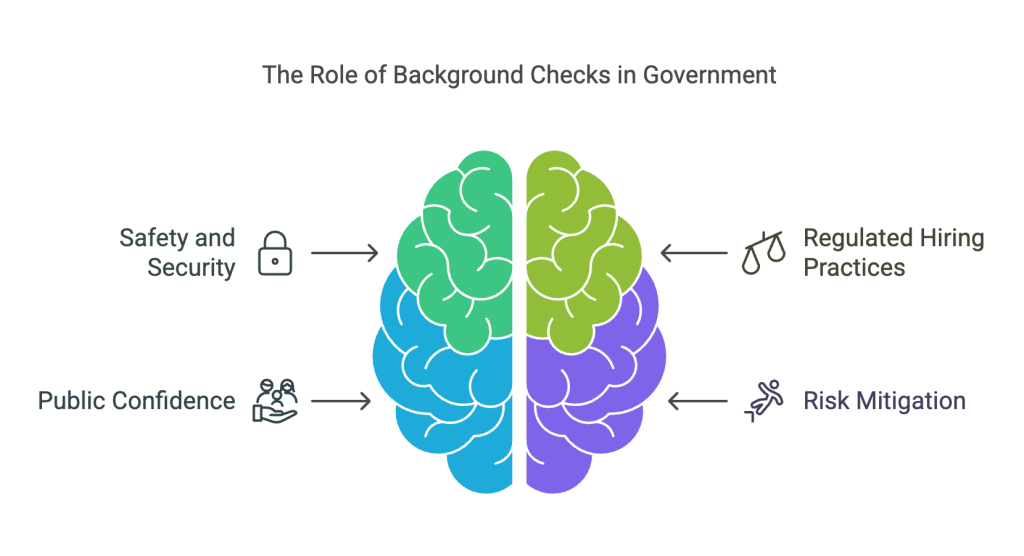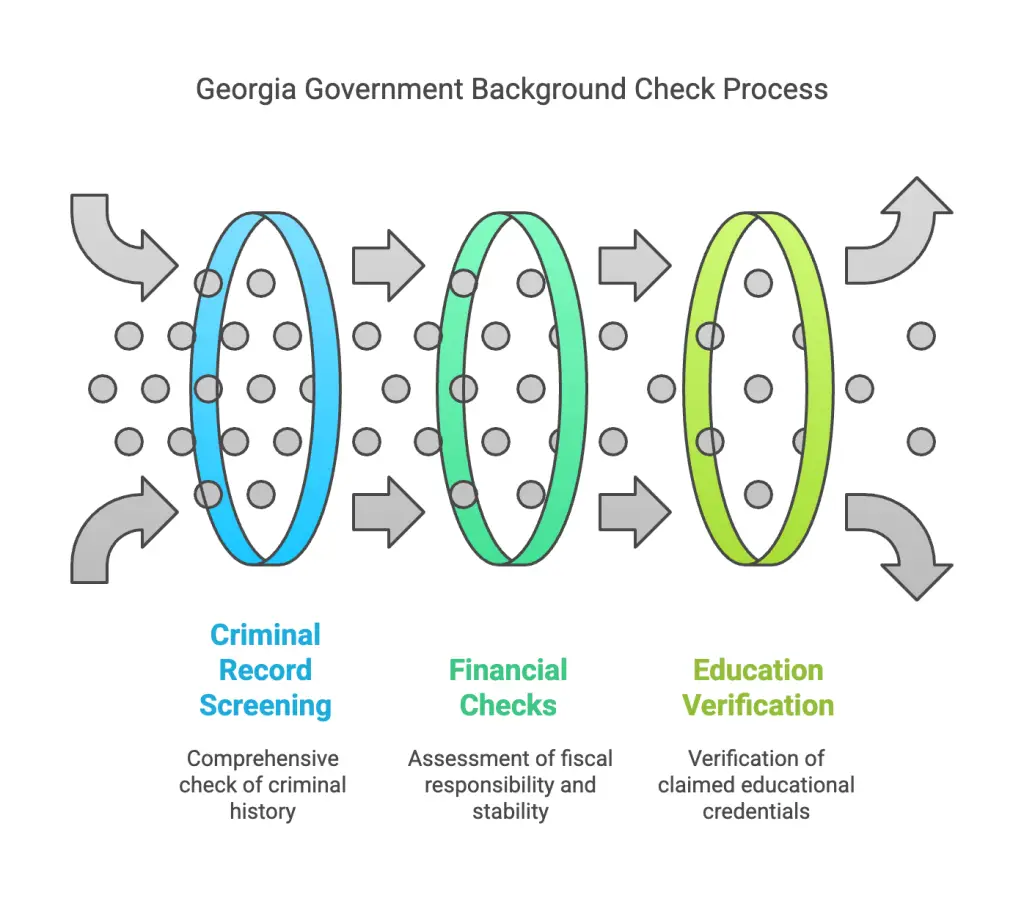Background checks are a crucial component in the hiring process, especially for government positions where safety, security, and integrity are paramount. As a prospective government employee or an HR professional, understanding Georgia's specific requirements and procedures for conducting background checks is essential. This comprehensive guide will explore the intricacies of Georgia government background checks, offering insights into the various screening processes involved and their implications for public sector hiring in Georgia.
Key Takeaways
- Background checks are essential for ensuring safety and integrity in Georgia's government hiring process.
- Criminal record screenings provide a full look at an applicant's legal history, supporting informed hiring decisions.
- Financial checks are crucial for roles involving budgeting, highlighting potential risk factors for employers.
- Education verification confirms that candidates have the necessary qualifications, preventing unqualified hires.
- HR professionals must stay current with Georgia's legal requirements and use technology effectively while respecting privacy.
Introduction
Background checks aren't just paperwork. They're a critical part of hiring for government jobs in Georgia. Safety and integrity are non-negotiables in these roles. This means that who gets hired matters.
Why focus on Georgia? Each state has its quirks, and Georgia is no different. From criminal screenings to education verification, Georgia has its specific steps.
We'll dig into what's required. You might have questions like, "What makes Georgia's process unique?" or “How do I prepare?” We’ll tackle these questions head-on.
The goal here is simple: to break down Georgia's background check requirements for government positions. This is your roadmap—clear and straightforward—whether you're a job seeker or HR professional. Let's get into it.
Importance of Background Checks in Government Positions
Safety and security. These are not just words but pillars for government positions. Background checks are the backbone of ensuring these aspects. They protect the public by ensuring that only trustworthy individuals hold positions of power and responsibility. As a government employee, you're entrusted with sensitive information and public resources. Without thorough background checks, this trust could be misplaced.
Regulated hiring practices exist for a reason. They help maintain fairness and consistency across the board, especially in a state like Georgia. You can't simply rely on intuition or gut feelings when hiring for government roles. Rigorous background checks align hiring practices with state and federal guidelines. This not only protects the organization but also upholds public confidence in government operations.
Data speaks volumes. Consider this: a study highlighted that organizations with inadequate screening procedures reported higher incidence rates of misconduct and fraud. While specific statistics for Georgia might vary, this trend underscores the role of meaningful checks in averting potential risks.

So, what does this mean for you? If you're involved in government hiring or seeking such a role, take background checks seriously. They separate qualified candidates from risky ones. They build a foundation of trust and integrity for government offices and ultimately contribute to the broader goal of maintaining a safe, secure, and effective government.
Components of a Georgia Government Background Check
Criminal Record Screening
When you're considering a government position in Georgia, criminal record screening is one of the first hurdles you'll encounter. These screenings pull data from federal, state, and local levels, ensuring a comprehensive view of an applicant's criminal history. This scope helps maintain a hiring process that prioritizes safety.
You might wonder why so much emphasis is placed on this. The answer lies in maintaining public trust. A thorough criminal check ensures that potential employees have a clean slate or a past that won't jeopardize their roles.
But, this process isn't without its pitfalls. There's a need to tread carefully to avoid biases. The Fair Credit Reporting Act (FCRA) and other laws provide guidelines to protect applicants from discrimination. Employers must ensure that any use of criminal history in hiring is relevant and justifiable. This balance of thoroughness and fairness is essential.
By focusing on these aspects, Georgia ensures that its government positions are filled by individuals who can be trusted with public responsibilities. This emphasis underscores the importance of criminal record screenings in safeguarding both the government and the public.
Financial Checks
In Georgia, financial checks hold weight for some government positions. These checks assess your fiscal responsibility and can reveal red flags that might concern an employer.
If you're applying for a role that handles budgets or financial decisions, a financial check will likely be part of your background screening. It involves examining credit history, debts, and any past bankruptcies.
Why is this important? Financial stability often correlates with reliability. Positions that manage public funds require integrity and trust. A history of financial woes might suggest potential risks.
What do HR teams look for during financial checks? They may focus on significant debts or missed payments, which could indicate poor money management. Bankruptcy might not disqualify you, but it could prompt further questions during the hiring process.
How could a financial history affect your eligibility? It doesn't automatically rule you out; context matters. Explaining circumstances around any financial setbacks can help mitigate negative perceptions. Transparency is critical, and addressing any concerns upfront can benefit you.
Think of this check as a reflection of how you handle responsibilities. If you're worried about your financial past, consider taking steps to improve your credit before applying. Understanding these checks can provide clarity and better prepare you for your next government role in Georgia.
Education Verification
Verifying educational credentials in Georgia follows a straightforward process. You begin by reaching out to the educational institutions directly or using trusted third-party verification services. These services confirm the legitimacy of degrees claimed by applicants.
Education verification is essential, particularly for roles that require specialized knowledge or skills. Government positions often demand precise qualifications. Verifying these prevents unqualified candidates from slipping through the cracks. It ensures that applicants possess the necessary educational background to perform effectively.
Discrepancies in educational claims can lead to significant consequences. If an applicant is found to have falsified their educational background, it could result in their disqualification or dismissal. The risks associated with hiring unqualified personnel make education verification a non-negotiable step in the hiring process.
Are you confident in the accuracy of the educational claims on your resume? Understanding this part of the background check process can ensure you're prepared. For HR professionals, being thorough with education verification safeguards against potential liabilities.

Legal and Compliance Aspects
When you're conducting background checks for government positions in Georgia, following the right legal and compliance guidelines is crucial. HR compliance isn't just about avoiding fines—it's about fair hiring practices and building a trustworthy workforce.
One of the primary tasks for HR professionals is adhering to Georgia-specific regulations. The state might have particular rules that differ from federal guidelines, affecting how background checks are conducted. For instance, Georgia may have restrictions on how criminal history is used in employment decisions. Familiarize yourself with these laws to ensure you're following them to the letter.
Federal guidelines, such as those set by the Equal Employment Opportunity Commission (EEOC), also play a significant role. The EEOC provides regulations to prevent discrimination during the hiring process. For example, they advise against blanket policies that automatically disqualify candidates with a criminal record. You need to consider the nature of the crime and its relevance to the job at hand.
Staying informed about both state and federal regulations is essential. They constantly evolve, affecting how background checks should be carried out. A compliance misstep can lead to legal repercussions and damage to your organization's reputation.
How often do you review your compliance practices? Are you sure they're up-to-date with Georgia's rules and federal laws? These are questions that should guide your approach when conducting background checks. Ensuring legal compliance not only safeguards your organization but also upholds the integrity and fairness of the hiring process.
Technological Advances in Background Screening
Technology continues to reshape the landscape of background checks. Emerging technologies now make the screening process more accurate and efficient. For instance, artificial intelligence aids in analyzing data quickly, pinpointing discrepancies in criminal records, financial histories, and educational credentials.
Digital screening tools streamline data collection and evaluation. They allow for real-time access to vast databases and offer instant updates. These tools reduce turnaround times, enabling faster hiring decisions. For example, cloud-based systems can store and organize large volumes of information, making it easier for HR teams to handle even complex background checks.
Yet, relying on technology brings risks. Data security is a paramount concern. Organizations must ensure applicant information remains private and protected from unauthorized access. An example of this is adopting encryption standards to safeguard sensitive data.
Efficiency must not overlook fairness. While digital tools enhance speed, they can inadvertently perpetuate biases if not carefully managed. It's crucial for HR professionals to frequently review and update their technological systems to avoid any unintended discrimination.
How will you balance the benefits of speed and accuracy with the need for fairness and privacy? Technology is transforming background checks, but human oversight remains key to making informed and equitable hiring decisions.
Social Considerations
You might assume that a rigorous screening process is just a formality, but it can profoundly affect job seekers. This process often feels like a stumbling block, especially if there's a blemish on your record. Knowing what's ahead can ease some of that anxiety.
It's crucial for background checks to be both thorough and fair. Biased screening practices can leave qualified candidates behind. As an HR professional or job seeker, understanding non-discriminatory practices helps everyone.
If you're a job seeker in Georgia, here are some actionable tips:
- Know Your Record: Request your background report to see what employers will find. This prepares you to address any concerns during the hiring process.
- Be Honest: Don't hide past incidents. Transparency can go a long way in building trust with potential employers.
- Gather Documentation: If you have any discrepancies, be ready with documentation or explanations. Having proof on hand can clarify misunderstandings.
- Stay Informed: Understand your rights under Georgia law and federal regulations like the Fair Credit Reporting Act (FCRA). Knowing your rights can empower you during the process.
Fairness in hiring means giving each candidate a true chance. By preparing for background checks and understanding the process, you can navigate it more effectively.
Actionable Takeaways for HR Professionals
Effective background checks require well-defined policies. As an HR professional, it's crucial to establish protocols that align with Georgia’s specific legal requirements. Begin by creating a standardized process map for screenings. This includes steps like obtaining informed consent, ensuring compliance with FCRA regulations, and setting clear criteria for evaluating results.
Training is indispensable. Equip your team to understand the complexities of government compliance. Regular workshops on evolving laws and best practices can keep your team updated. Consider certifications or courses focused on public sector hiring standards.
Continuous monitoring is often overlooked. Once an individual is hired, you should conduct periodic re-screens, especially for roles with access to sensitive information. This proactive approach mitigates potential risks and reinforces a culture of transparency and trust.
Finally, always document all procedures and outcomes meticulously. This not only ensures accountability but also provides a reference point for resolving disputes or refining policies as necessary.
With these practices, you can enhance the integrity and effectiveness of your background check process. Are your current policies comprehensive enough? How can they evolve to meet emerging challenges? These reflections can drive continuous improvement in your hiring protocols.
External Resources and Further Reading
For more information on hiring practices and background checks, several resources can provide valuable insights. The U.S. Department of Labor offers a broad overview of federal hiring guidelines and practices. It's a great starting point for understanding national standards that can influence state-specific procedures in Georgia.
The Equal Employment Opportunity Commission (EEOC) website offers guidance on fair hiring practices, which are vital when conducting background checks. It can help ensure that your processes are compliant with anti-discrimination laws.
For a deeper dive into Georgia's specific legal landscape, the Georgia Department of Administrative Services provides resources and information on state-specific regulations. They outline the rules and legal requirements for conducting background checks for government positions in Georgia.
Additionally, seeking advice from industry experts or legal professionals who specialize in employment law in Georgia can offer more tailored insights. Conferences and workshops on HR compliance often host seasoned professionals who share practical experiences and up-to-date information.
Engaging with these resources can equip you with knowledge beyond this article, enhancing your understanding of background check procedures and compliance in Georgia's government sector.
Background checks for government positions in Georgia play an integral role in ensuring the safety, integrity, and trust associated with public sector employment. These checks help safeguard public welfare and maintain compliance with regulated hiring practices. Each component, from criminal record screening to financial checks and education verification, works cohesively to protect against potential threats and ensure only eligible candidates are considered.
Conclusion
Criminal record screenings delve into federal, state, and local records, providing a comprehensive view of an applicant's history. Financial checks are crucial for roles involving fiscal duties, looking for red flags that could signify potential risks. Education verification confirms claims about academic qualifications, ensuring transparency and accuracy in the hiring process.
HR professionals must navigate these background checks while adhering to both Georgia-specific laws and federal guidelines, ensuring compliance with EEOC standards and maintaining fairness. Technological advancements have modernized these processes, offering more efficient and precise screenings while also emphasizing the need for privacy and security.
The rigorous nature of these checks impacts job seekers and requires them to prepare thoroughly. Meanwhile, HR professionals must strive for fair practices, focusing on continuous training and policy development to better implement these screenings.
Thorough background checks are vital in upholding the standards of government positions. Encouraging fairness and compliance in these practices ensures the continued integrity and trust in government roles. Both job seekers and HR professionals must understand these processes to contribute effectively to the safety and efficiency of public sector hiring.
Frequently Asked Questions (FAQs)
What background checks are required for government jobs in Georgia?
Government jobs in Georgia typically require checks on criminal history, employment history, education verification, and identity verification. Some positions may also require credit checks and drug testing.
How do financial checks impact government hiring in Georgia?
Financial checks can affect hiring, especially for roles involving financial responsibilities or sensitive information. Poor credit may raise questions about reliability, though it’s not automatically disqualifying.
Are criminal records automatically disqualifying for Georgia public sector jobs?
Not all criminal records will disqualify candidates, but serious offenses or those directly related to the job’s duties can be problematic. Each situation is considered on a case-by-case basis.
How can job seekers prepare for background checks for Georgia government roles?
Ensure that all information in your applications is accurate and up-to-date. Be ready to discuss any issues in your records openly. Obtain copies of your own records for review beforehand.
Are government background checks more rigorous than private sector checks in Georgia?
Government checks can be more comprehensive due to security and public trust considerations. They often include extensive vetting, which may not be as detailed in the private sector.
What additional screening processes are common for Georgia government employees?
Polygraph tests, drug screening, and psychological evaluations are additional screenings used mainly for roles with high security or public safety importance.
How long do background checks typically take for Georgia government jobs?
Checks can take several weeks to complete, depending on the complexity and the role. It involves coordinating with various agencies for thorough vetting.
Do you need to disclose all previous employments during the background check?
Yes, it’s important to provide a complete and accurate employment history. Omissions can be seen as red flags.
Can personal references impact the outcome of the background check?
Yes, personal references can provide insights into your character and work ethic, helping complete the assessment of your suitability for the role.
How often are background checks updated for current Georgia government employees?
Periodic checks may occur, especially in roles involving security clearances. Specifics depend on the agency and role requirements.
Definitions
- Background Checks - A background check is a review of an applicant’s history, including criminal records, financial history, and education verification. Employers use it to confirm a candidate’s qualifications and ensure they meet the job’s standards. In government hiring, this process helps maintain trust and security.
- Hiring Practices - Hiring practices refer to the policies and procedures organizations follow when selecting employees. These include job postings, interviews, background checks, and compliance with legal guidelines. Government agencies must follow strict rules to ensure fair and consistent hiring.
- Criminal Record Screening - Criminal record screening checks an applicant’s history for any past offenses. This review includes federal, state, and local records. Employers use this information to assess any risks a candidate might pose in a government job.
- Education Verification - Education verification confirms an applicant’s academic credentials. Employers contact schools or use third-party services to ensure degrees and certifications are valid. This step prevents candidates from misrepresenting their qualifications.
- Compliance - Compliance means following laws and regulations related to hiring and background checks. Government agencies must adhere to state and federal rules, such as the Fair Credit Reporting Act (FCRA) and Equal Employment Opportunity Commission (EEOC) guidelines, to ensure a fair hiring process.

GCheck Editorial Team
Meet the GCheck Editorial Team, your trusted source for insightful and up-to-date information in the world of employment background checks. Committed to delivering the latest trends, best practices, and industry insights, our team is dedicated to keeping you informed.
With a passion for ensuring accuracy, compliance, and efficiency in background screening, we are your go-to experts in the field. Stay tuned for our comprehensive articles, guides, and analysis, designed to empower businesses and individuals with the knowledge they need to make informed decisions.
At GCheck, we're here to guide you through the complexities of background checks, every step of the way.





